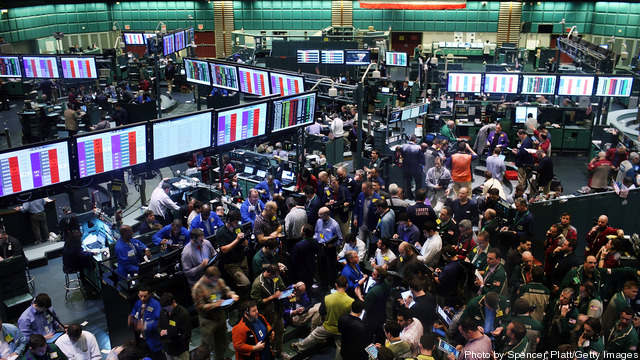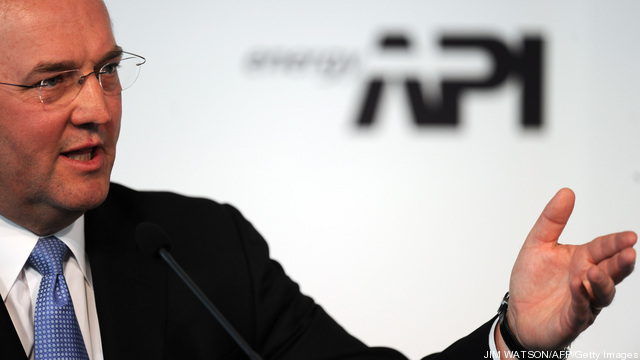
Eni SpA, Italy’s biggest energy company by market value, said Tuesday that a refining boom in the Middle East is putting pressure on European refiners because the MidEast producers, who have lower costs, are now entering the market in Europe especially the Mediterranean. “Italy was a hub for Middle Eastern crude, but not anymore as Middle East [oil companies] are now vertically integrated,” Domenico Elefante, Eni’s executive vice president for refining, told Dow Jones Newswires on the sidelines of the Global Refining Summit in Barcelona. Elefante also said it isn’t a problem for Eni to replace Iranian barrels which are subject to western sanctions as the import volumes have been low. He didn’t provide further details on the volumes.
Oil
Sign up and get Breaking Energy news in your inbox.
We will never sell or share your information without your consent. See our privacy policy.
 (From L) Italian Prime Minister Mario Monti, Canadian Prime Minister Stephen Harper, French President Francois Hollande, US President Barack Obama, UK Prime Minister David Cameron, Russian Prime Minister Dmitry Medvedev, (From R) Japanese Prime Minister Yoshihiko Noda, European Commission President Jose Manuel Barroso, European Council President Herman Van Rompuy, and German Chancellor Angela Merkel take part in a working session of the G8 summit in Camp David, Maryland, on May 19, 2012. AFP PHOTO/RIA NOVOSTI/POOL/MIKHAIL KLIMENTYEV
(From L) Italian Prime Minister Mario Monti, Canadian Prime Minister Stephen Harper, French President Francois Hollande, US President Barack Obama, UK Prime Minister David Cameron, Russian Prime Minister Dmitry Medvedev, (From R) Japanese Prime Minister Yoshihiko Noda, European Commission President Jose Manuel Barroso, European Council President Herman Van Rompuy, and German Chancellor Angela Merkel take part in a working session of the G8 summit in Camp David, Maryland, on May 19, 2012. AFP PHOTO/RIA NOVOSTI/POOL/MIKHAIL KLIMENTYEV
At the Camp David Summit, G-8 Leaders recognized that the development of and universal access to environmentally safe, sustainable, secure, and affordable sources of energy is essential to global economic growth and to their overall efforts to address climate change. As such, they identified several actions for the G-8 to take together: Keep reading →

Energy policy in the US has been a prominent issue leading up to the elections this fall and the topic could gain momentum along the way. Commodity price manipulation, fracking, the Keystone pipeline and environmental regulations were just a few of the topics discussed at a breakfast panel held by the American Petroleum Institute in Washington DC this morning.
Recent upward trending US oil and natural gas production is great news for the nation, but the political system is driven by negatives, said former Senator and Congressman of North Dakota, Byron Dorgan. Keep reading →

When gasoline prices began to spike earlier this year, the popular opinion was that oil prices would continue to climb into the peak summer travel season.

The head of the American Petroleum Institute on Wednesday signaled a thaw in relations between major oil companies and the Obama administration, telling reporters that the White House has started more constructive talks with the lobby on energy development.
“We have noticed a marked change in our dialogue, perhaps just over the last three or four months,” API President Jack Gerard told reporters. “We have opened a dialogue that is constructive and we give credit where it is due: the president and his people are having a more open dialogue with us.” Keep reading →

As nations continue to wrangle over the control, development and transportation of Caspian basin oil and gas resources, recent new discoveries in the Eastern Mediterranean Sea have raised the potential conflict level between governments, corporations and other relevant parties. But the discovery of what appear to be substantial natural gas deposits, also presents great opportunity.
“There was some concern a number of months ago about these gas finds off the southern coast of Cyprus… now the US would have to have more of a naval presence in the Eastern Mediterranean in order to de-conflict these forces..,” Steven A. Cook, Council on Foreign Relations’ Hasib J. Sabbagh Senior Fellow for Middle Eastern Studies told journalists at a recent roundtable for select media. Keep reading →

The race for oil in the Arctic is on. As the polar ice cap retreats, energy companies are looking north for a potentially huge new source of crude supply. In April, Exxon Mobil and Russian oil giant Rosneft announced a partnership to develop Arctic reserves in the Kara Sea estimated at up to 85 billion barrels. And this summer, Shell is expected to begin exploratory offshore drilling in the Arctic Ocean off the coast of Alaska. In his new book The Eskimo and the Oil Man, Bob Reiss details Shell’s years-long effort to win approval for this multi-billion-dollar project and explains the economic and geopolitical ramifications of the competition for control of the Arctic. But getting the oil out won’t be easy. It could require lots of nuclear-powered icebreakers.

The Obama administration tightened rules on hydraulic fracturing late last week, requiring the disclosure of chemicals used in the process when done on federal and American Indian lands. The new rules will also require additional testing of oil and gas well construction and require the industry to have a management plan for the water used in the process. “This proposed rule will strengthen the requirements for hydraulic fracturing performed on federal and Indian lands in order to build public confidence and protect the health of American communities, while ensuring continued access to the important resources that make up our energy economy,” the Interior Department said in a statement. The move is part of a broader administration effort to increase rules for the controversial practice. Earlier this month, the Environmental Protection Agency tightened air pollution requirements for new oil and gas wells.
 France’s Socialist Party (PS) newly-elected President Francois Hollande (R) reacts on stage, flanked by (from L, 1st row) socialist Arnaud Montebourg, socialist President of the Poitou-Charentes region Segolene Royal, Hollande’s campaign political advisor Jean-Michel Baylet, Hollande’s campaign manager Pierre Moscovici, Hollande’s campaign political advisor Harlem Desir, Hollande’s campaign chief of staff Faouzi Lamdaoui, Hollande’s campaign political advisor Martine Aubry and Hollande’s companion Valerie Trierweiler, at the Place de la Bastille in Paris on May 7, 2012, after the announcement of the first official results of the French presidential second round. Hollande had won with 51.62 percent of the vote to 48.38 percent for Sarkozy on May 6, 2012, becoming France’s first Socialist president since Francois Mitterrand left office in 1995. AFP PHOTO / FRANCK FIFE
France’s Socialist Party (PS) newly-elected President Francois Hollande (R) reacts on stage, flanked by (from L, 1st row) socialist Arnaud Montebourg, socialist President of the Poitou-Charentes region Segolene Royal, Hollande’s campaign political advisor Jean-Michel Baylet, Hollande’s campaign manager Pierre Moscovici, Hollande’s campaign political advisor Harlem Desir, Hollande’s campaign chief of staff Faouzi Lamdaoui, Hollande’s campaign political advisor Martine Aubry and Hollande’s companion Valerie Trierweiler, at the Place de la Bastille in Paris on May 7, 2012, after the announcement of the first official results of the French presidential second round. Hollande had won with 51.62 percent of the vote to 48.38 percent for Sarkozy on May 6, 2012, becoming France’s first Socialist president since Francois Mitterrand left office in 1995. AFP PHOTO / FRANCK FIFE
The last 48 hours shifted the political landscape across Europe, and with it, the debate over energy policy. Keep reading →

Natural gas could reach the status of a globally priced and traded commodity within five years if sufficient shipping capacity is developed.
The use of natural gas in transport has the potential to change the role of energy infrastructure, politics and investing, but without the right mix of government policies and business commitment fuel consumption patterns will lag broader shifts that include a shift in consumption power to emerging economies. Keep reading →
